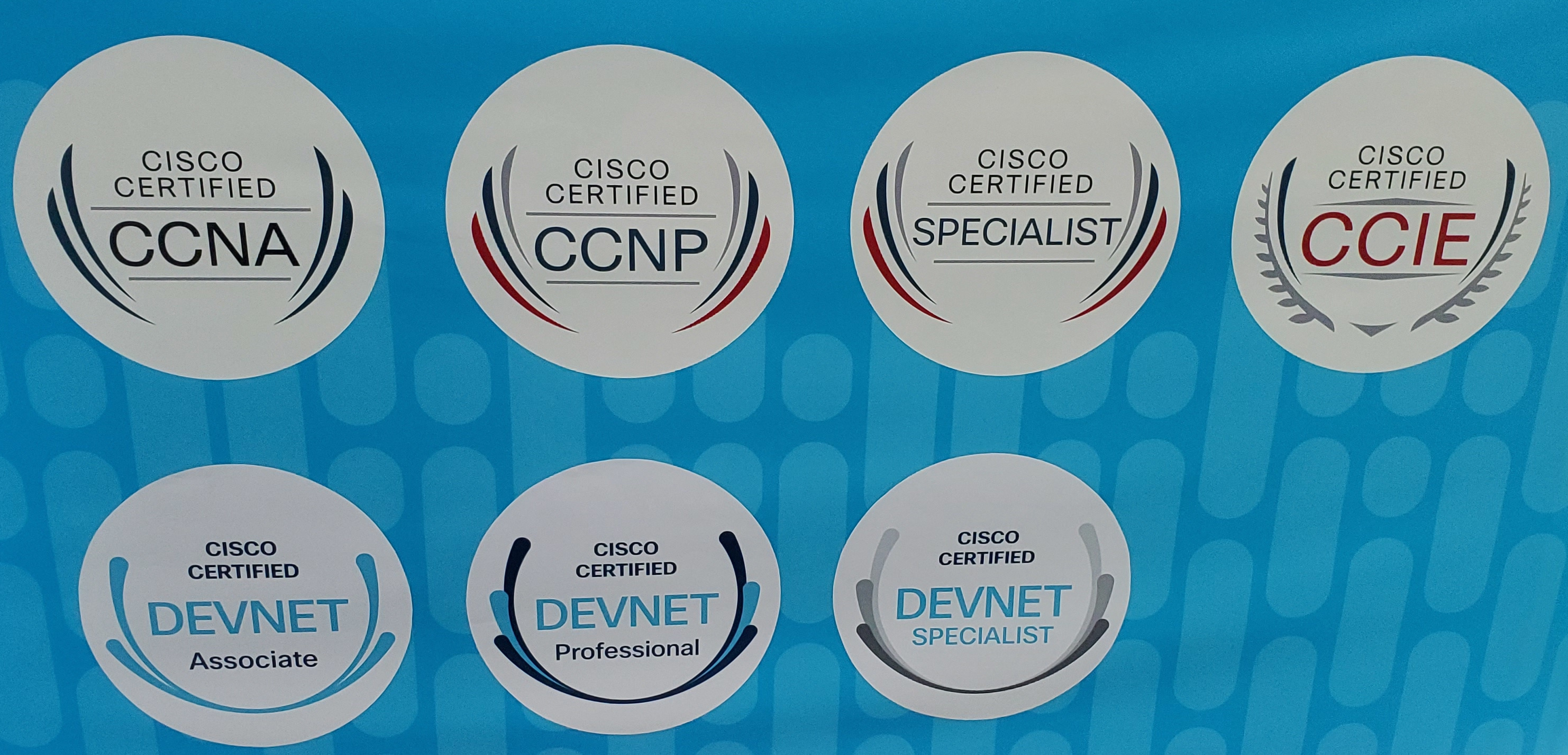The New Cisco CCNA, Specialist & CCNP Programs
June 17, 2019
Cisco is changing their entire Certification program. Here’s the new CCNA through CCNP programs.

Cisco hosted their annual technology conference, Cisco Live in San Diego on the week of June 9th and the early big announcement at the conference was that the Cisco certifications were changing to reflect needs of the IT community. The new program will take effect on February 24, 2020.
In this post, I’m going to break down the changes to the CCNA through CCNP programs, and how those changes affect you if you are going for the cert or if you already have the cert. But first things first, if you are currently working towards a Cisco certification, the most important thing you need to know is to KEEP PURSUING YOUR CERT! If you achieve a certification before the change, your certification will be automatically converted into the new cert program. If you have passed some of the tests toward the cert, you will receive credit towards the new cert format and will not have to start over.
The changes to the CCIE program & the introduction of the DevNet Certifications will be covered in follow-up postings and I will link to them once they are up.
Cisco Certified Network Associate & Cisco Certified Design Associate: CCNA/CCDA
The most noticeable change to the Cisco CCNA program is that all the existing CCNA’s are being consolidated into a single CCNA cert. If you are currently working towards a CCNA in Routing and Switching and have already achieved the CCENT certification by passing the ICND1 exam, you have until February 23rd, 2020 to pass the ICND2 exam or you will be required to take the new CCNA exam.
The new CCNA test will go live on February 24th, 2020. If you currently hold a CCNA in any of the specializations or a CCDA, after February 24th, 2020, your certification will be converted to the new CCNA and you will receive a training badge for the specialization of your CCNA/CCDA.
As with the current CCNA program, the certification is valid for 3 years, but there are changes coming on how to recertify. You can recertify by passing an associate level exam, a professional concentration exam, a technology core exam, or a CCIE lab exam. Additionally, you can recertify by earning 30 Continuing Education (CE) credits.
The new process for recertifying a CCNA certification is as follows:
| Duration | Exam Recertification | Continuing Education (CE) |
|---|---|---|
| 3 Years |
| Earn 40 CE Credits |
Specialist Certification
The Cisco Specialist Certification is a new certification level going live on February 24th, 2020. Instead of the various focuses of the CCNA certification that exist today. In the new certification track, once you earn the CCNA, you can then take an exam for a specialist certification focusing on a technology area. To start with the new program, there are six specialist tracks, each broken down into a more specialized focus area within the track. The Tracks are, Enterprise, Data Center, Security, Service Provider, Collaboration, & DevNet. I will dive into the DevNet certifications in another post. For the other five specialist programs, here is the specialization breakdown that will go live on February 24, 2020:
| Enterprise | Data Center | Security | Service Provider | Collaboration |
|---|---|---|---|---|
|
|
|
|
|
The process for recertifying a Specialist Certification is as follows:
| Duration | Exam Recertification | Continuing Education (CE) |
|---|---|---|
| 3 Years |
| Earn 40 CE Credits |
Cisco Certified Network Professional & Cisco Certified Design Professional: CCNP/CCDP:
Like the Specialist Certification, the new CCNP program will have six tracks with the same names:
- CCNP Enterprise
- CCNP Data Center
- CCNP Security
- CCNP Service Provider
- CCNP Collaboration
- Cisco Certified DevNet Professional
Each CCNP certification will require only two exams instead of the three or four in the current program. The first exam is a core exam and the second is a professional concentration exam. A key difference in the new program is that completing a CCNP will set you up for the CCIE program as the core exam in each concentration is also a qualifying exam for the CCIE lab exam in that track. The new CCNP program also has no prerequisites, a major difference from the current CCNP program which requires a current CCNA in the same track or any current CCIE.
CCNP Enterprise:
The new CCNP Enterprise will take the place of the current CCNP Routing & Switching, CCNP Wireless & CCDP certifications. To earn a CCNP Enterprise, you will need to pass the core exam, “Implementing and Operating Cisco Enterprise Network Core Technologies (ENCOR)” and then one of the following concentration exams:
- Implementing Cisco Enterprise Advanced Routing & Services (ENARSI)
- Implementing Cisco SD-WAN Solutions (ENSDW)
- Designing Cisco Enterprise Networks (ENSLD)
- Designing Cisco Enterprise Wireless Networks (ENWLSD)
- Implementing Cisco Enterprise Wireless Networks (ENWLSI)
- Automating and Programming Cisco Enterprise Solutions (ENAUTO)
CCNP Data Center:
The new CCNP Data Center will replace of the current CCNP Data Center. To earn a CCNP Data Center, you will need to pass the core exam, “Implementing and Operating Cisco Data Center Core Technologies (DCCOR)” and one of the following concentration exams:
- Designing Cisco Data Center Infrastructure (DCID)
- Troubleshooting Cisco Data Center Infrastructure (DCIT)
- Implementing Cisco Application Centric Infrastructure (DCACI)
- Implementing Cisco Storage Area Networking (DCSAN)
- Automating and Programming Cisco Data Center Solutions (DCAUTO)
CCNP Security:
The new CCNP Security will replace the current CCNP Security. To earn a CCNP Security, you will need to pass the core exam, “Implementing and Operating Cisco Security Core Technologies (SCOR)” and one of the following exams:
- Securing Networks with Cisco Firepower (SNCF)
- Implementing and Configuring Cisco Identity Services Engine (SISE)
- Securing Email with Cisco Email Security Appliance (SESA)
- Securing the Web with Cisco Web Security Appliance (SWSA)
- Implementing Secure Solutions with Virtual Private Networks (SVPN)
- Automating and Programming Cisco Security Solutions (SAUTO)
CCNP Service Provider:
The new CCNP Service Provider will replace the current CCNP Service Provider. To earn a CCNP Service Provider, you will need to pass the core exam, “Implementing and Operating Cisco Service Provider Network Core Technologies (SPCOR)” and one of the following exams:
- Implementing Cisco Service Provider Advanced Routing Solutions (SPRI)
- Implementing Cisco Service Provider VPN Services (SVPI)
- Automating and Programming Cisco Service Provider Solutions (SPAUTO)
CCNP Collaboration:
The new CCNP Collaboration will replace the current CCNP Collaboration. To earn a CCNP Collaboration, you will need to pass the core exam, “Implementing and Operating Cisco Collaboration Core Technologies (CLCOR)” and one of the following exams:
- Implementing Cisco Collaboration Applications (CLICA)
- Implementing Cisco Advanced Call Control and Mobility Services (CLACCM)
- Implementing Cisco Collaboration Cloud and Edge Solutions (CLCEI)
- Automating Cisco Collaboration Solutions (CLAUTO)
When you earn the new CCNP, you will receive both the CCNP Certification in the concentration of your choosing, but also the equivalent specialist certification(s) based on the concentration exam you took to earn the CCNP.
The new process for recertifying a CCNP is as follows:
| Duration | Exam Recertification | Exam + Continuing Education (CE) | Continuing Education (CE) |
|---|---|---|---|
| 3 Years |
| Pass any one Professional Concentration Exam AND earn 40 CE credits | Earn 80 CE Credits |
This is a lot to take in and I will cover the new CCIE Program in the next post. But as stated earlier, If you are working towards any current Cisco certification, keep working on it. You will get credit towards the new certifications when they go live on February 24, 2020. If you currently hold Cisco Certifications, your current certs will migrate into the new program.
Keep studying, Keep Learning. Keep improving yourself.

